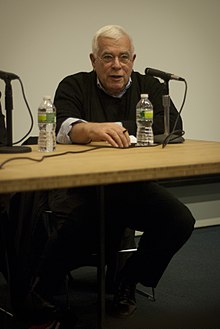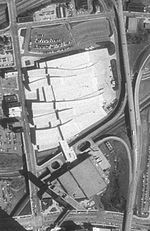Peter Eisenman
Peter Eisenman | |
|---|---|
 Eisenman at GSAPP | |
| Born | August 11, 1932 Newark, New Jersey,U.S. |
| Alma mater | Cornell University Columbia University University of Cambridge |
| Occupation | Architect |
| Buildings | House VI Memorial to the Murdered Jews of Europe City of Culture of Galicia |
Peter David Eisenman(born August 11, 1932) is an American architect, writer, and professor. Considered one of theNew York Five,Eisenman is known for his high modernist and deconstructive designs, as well as for his authorship of several architectural books. His work has won him several awards, including theWolf Prize in Arts.[1]
Biography
Early life
Peter Eisenman was born toJewishparents on August 11, 1932, inNewark,New Jersey.[2][3]As a child, he attendedColumbia High Schoollocated inMaplewood, New Jersey.He transferred into the architecture school as an undergraduate atCornell Universityand gave up his position on the swimming team in order to commit full-time to his studies. He received aBachelor of Architecturedegree from Cornell, aMaster of Architecturedegree fromColumbia University'sGraduate School of Architecture, Planning and Preservation,andMAandPhDdegrees from theUniversity of Cambridge.He received an honorary degree fromSyracuse University School of Architecturein 2007.[citation needed]
Career
He first rose to prominence as a member of theNew York Five(also known as "the Whites" ), along with fellow architectsCharles Gwathmey,John Hejduk,Richard Meier,andMichael Graves.Some of their work was presented at a CASE Studies conference in 1969, catapulting their respective careers. Eisenman received a number of grants from the Graham Foundation for work done in this period[when?].The New York Five began their careers by iterating onLe Corbusier's distinctive style, but they all subsequently developed unique styles and ideologies, with Eisenman becoming more affiliated withDeconstructivism.

Eisenman currently teaches theory seminars and advanced design studios at theYale School of Architecture,and is Professor Emeritus at theCooper UnionSchool of Architecture.[4][5]Previously, he taught at theUniversity of Cambridge,Harvard University,theUniversity of Pennsylvania,Princeton University School of Architecture,and theOhio State University.He founded theInstitute for Architecture and Urban Studiesin 1967 and served as its Executive Director until 1981.[citation needed]

His professional work is often referred to as formalist, deconstructive, late avant-garde, late and high modernist.[citation needed]The fragmenting of forms visible in some of his projects has been identified as characteristic ofdeconstructivism,and he has become one of the movement's flagbearer. In 1988, he was featured in the "Deconstructivists" exhibit at theMuseum of Modern Artin New York.[6]
While well known for his single-family residences, particularly his "House" series, he has also worked on several large-scale non-residential projects as well. Some examples include theMemorial to the Murdered Jews of EuropeinBerlin[7]and the newUniversity of Phoenix StadiuminGlendale, Arizona.His largest project to date is theCity of Culture of Galiciain Santiago de Compostela, Spain. In his practice, Eisenman was an early advocate of computer-aided design, employing fledgling innovators such asGreg LynnandIngeborg Rockeras early as 1989.[citation needed]
His writings have pursued topics including comparative formal analyses; the emancipation and autonomization of architecture; and histories of Architects. Architects he has written about includeGiuseppe Terragni,Andrea Palladio,Le CorbusierandJames Stirling.Additionally, he is featured in wide print and many films, including the 2008 filmPeter Eisenman: University of Phoenix Stadium for the Arizona Cardinalsin which he provides a tour of his recent construction.[citation needed]
Eisenman has won several awards, including theNational Design Awardfor Architecture in 2001, and theWolf Prize in Artsin 2010.[8][1]
Criticism
Several criticisms have been waged against Eisenman over his designs, style, and perspective on the field of architecture. In 1972,Colin Rowewrote that he pursued a physique form of European modernism rather than utopian social agendas.[9]And, more recently, accusations have been made that Eisenman's work is "post-humanist". His apathy towards the recent "green" movement, too has been considered polarizing or "out-of-touch". Despite these claims of polarity and divisiveness, Eisenman has famously pursued dialogues with important cultural figures internationally. These include his English mentorColin Rowe,the Italian historianManfredo Tafuri,George Baird,Fredric Jameson,Laurie Olin,Rosalind KraussandJacques Derrida.[10]
Another point of criticism over his work has been the state of some of his deconstructivist buildings. TheWexner Center,the first major public deconstructivist building, has required extensive and expensive retrofitting due to major design flaws, such as incompetent material specifications, and fine art exhibition space exposed to direct sunlight. It was frequently repeated that the Wexner's colliding planes tended to make its users disoriented to the point of physical nausea; in 1997 researcherMichael Pollantracked the source of this rumor back to Eisenman himself. In architectural historian Andrew Ballantyne's opinion, "By some scale of values, he was actually enhancing the reputation of his building by letting it be known that it was hostile to humanity." Eisenman'sHouse VI,designed for clients Richard and Suzanne Frank in the mid-1970s, also required several costly fixes resulting in the couple turning against Eisenman.
Buildings and works

- House I,Princeton, New Jersey,1968
- House II (Falk House),Hardwick, Vermont,1969
- House III,Lakeville, Connecticut,1971
- House IV,Falls Village, Connecticut,1971
- House VI(Frank residence),Cornwall Connecticut,1975
- House X,Bloomfield Hills, Michigan,1975
- Brooklyn Firehouse,New York City, New York,1985
- IBA Social Housing,Berlin, West Germany,1985
- Wexner Center for the Arts,Ohio State University,Columbus, Ohio,1989
- Koizumi Sangyo Headquarters,Tokyo,Japan,1990
- Groningen Music-Video Pavilion,Groningen, Netherlands,1990
- Nunotani building,Tokyo Japan,1992
- Greater Columbus Convention Center,Columbus, Ohio,1993
- JCDecauxBus Shelter,Aachen, Germany,1996
- University of CincinnatiArnoff Center,Cincinnati, Ohio,1996
- City of Culture of Galicia,Santiago de Compostela,Galicia,Spain,1999
- Il giardino dei passi perduti,Castelvecchio Museum,Verona,2005 (temporary installation - now removed)
- Memorial to the Murdered Jews of Europe,Berlin,2005
- State Farm Stadium,Glendale, Arizona,2006
- Residenze Carlo Erba,Milan, Italy,2019
Bibliography
- Peter Eisenman,Houses of Cards.New York: Oxford University Press, 1987.ISBN0-19-505130-0
- Peter Eisenman,Diagram Diaries(Universe Architecture Series), Thames and Hudson, 1999.ISBN0-7893-0264-0
- Blurred Zones: Investigations of the Interstitial: Eisenman Architects 1988-1998
- Peter Eisenman,Giuseppe Terragni: Transformations, Decompositions, Critiques,New York, The Monacelli Press 2003ISBN1-885254-96-2
- Peter Eisenman,Eisenman Inside Out. Selected Writings 1963-1988,New Haven-London, Yale University Press 2004ISBN0-300-09008-0
- Peter Eisenman,Ten Canonical Buildings 1950-2000,New York, Rizzoli International Publications inc. 2008ISBN0-8478-3048-9
- Peter Eisenman et al.,Peter Eisenman: In dialogue with architects and philosopher(Vladan DjokićandPetar Bojanić(eds.)), Mimesis International. 2017,ISBN9788869771132
- Peter Eisenman,Memory Games,Rizzoli. 1996ISBN978-0847818518
- Peter Eisenman and Elisa Iturbe,lateness2020, Princeton University Press.[11]ISBN9780691147222
Notes
- ^ab"Awards — EISENMAN ARCHITECTS".eisenmanarchitects.Archivedfrom the original on 2023-07-04.Retrieved2023-07-04.
- ^Eran Neuman,Longing for the Impossible,Haaretz, 12 May 2010Archived31 May 2017 at theWayback Machine.Quote: "" I didn't know I was Jewish until I encountered anti-Semitism at the age of 10... "Even though he grew up in a non-Zionist and assimilated family where his father held radical leftist views...."
- ^Peter EisenmanArchived2016-03-03 at theWayback Machine,Great Buildings Online. Accessed September 19, 2008.
- ^"Peter Eisenman Faculty Profile".Yale School of Architecture. Archived fromthe originalon 2013-08-21.
- ^"Faculty Profile Peter Eisenman".Cooper Union School of Architecture. Archived fromthe originalon 2009-08-12.
- ^"Deconstructivist Architecture"(PDF).Museum of Modern Art.1988.Archived(PDF)from the original on 2023-07-04.Retrieved2023-07-04.
- ^Meomorial to the Murdered Jews of Europe: A memorial in the centre.Archived2023-10-03 at theWayback MachineIn:Sites of UnityArchived2023-09-17 at theWayback Machine(Haus der Geschichte), 2022.
- ^"Profile of Peter Eisenman".Cooper-Hewitt National Design Museum.Archivedfrom the original on 2006-10-05.Retrieved2010-08-24.
- ^"Five Architects," (New York: Wittenborn, 1972)
- ^Derrida's GardenArchived2011-07-06 at theWayback Machineby Eleanor Morgan inFillip
- ^Eisenman, Peter; Iturbe, Elisa (7 July 2020).Lateness.Princeton University Press.ISBN9780691147222.Archivedfrom the original on 31 October 2020.Retrieved28 October2020.
References
- Interview: Peter Eisenman,Threshold, Rizzoli, 1983.
- Kari Jormakka,Interview with Peter Eisenman,Datutop14, 1991.
- Ballantyne, Andrew (2002).What Is Architecture?.London: Routledge.ISBN0-415256-26-7.
- Hendrix, John Shannon (2006).Architecture and Psychoanalysis: Peter Eisenman and Jacques Lacan.New York: Peter Lang.ISBN0-820481-71-8.
- Pangalos P., Petridou V., The imprint of Eisenman, ed. Futura, Athens, 2013.
- Meier A.,Peter Eisenman: Machine Critique de l'ArchitectureArchived2019-07-01 at theWayback Machine,ed. Infolio, Gollion (CH), 2019, 252p.ISBN978-2-88474-789-9
External links
- Eisenman Architects official website
- Finding aid for the Peter Eisenman fonds,Canadian Centre for Architecture(digitized items)
- Video interview with Eisenman from 1996
- Archinect interview
- designboom interview
- Eisenman's politicsan interview with Robert Locke
- Eisenman in conversation with Iman Ansari
- "Contrasting Concepts of Harmony in Architecture: The 1982 Debate Between Christopher Alexander and Peter Eisenman"
- Eisenmania
- "Being Eisenman" video 2004, a personal interview with famous architecture friendsonYouTube
- Finding aid for Peter Eisenman architectural drawings for House VI, 1972.Getty Research Institute,Los Angeles. Accession No. 920049. Sixty-three architectural drawings in pencil, pen and marker on paper document the design development of House VI, one of Peter Eisenman's most important early polemical designs.
- 1932 births
- Alumni of Trinity College, Cambridge
- 20th-century American architects
- American architecture writers
- 20th-century American Jews
- American male non-fiction writers
- Architectural theoreticians
- Columbia High School (New Jersey) alumni
- Cornell University College of Architecture, Art, and Planning alumni
- Columbia Graduate School of Architecture, Planning and Preservation alumni
- Deconstructivism
- Living people
- Members of the American Academy of Arts and Letters
- Jewish architects
- Postmodern architects
- Artists from Newark, New Jersey
- National Design Award winners
- Wolf Prize in Arts laureates
- Yale School of Architecture faculty
- Architecture educators
- 21st-century American architects
- 21st-century American Jews
